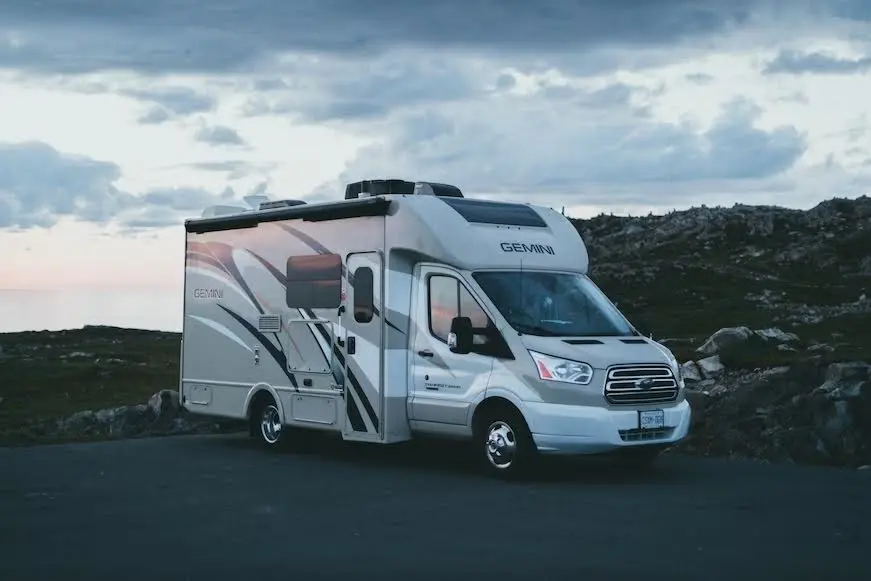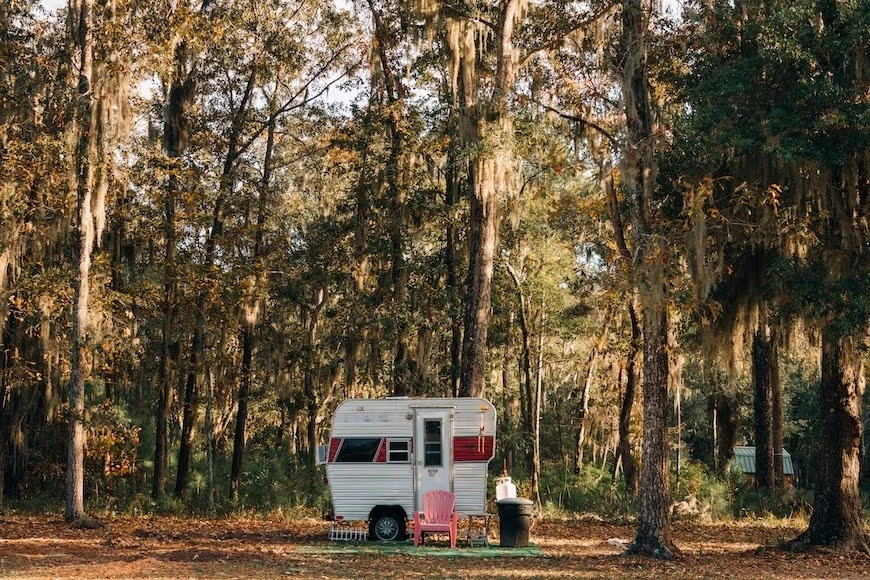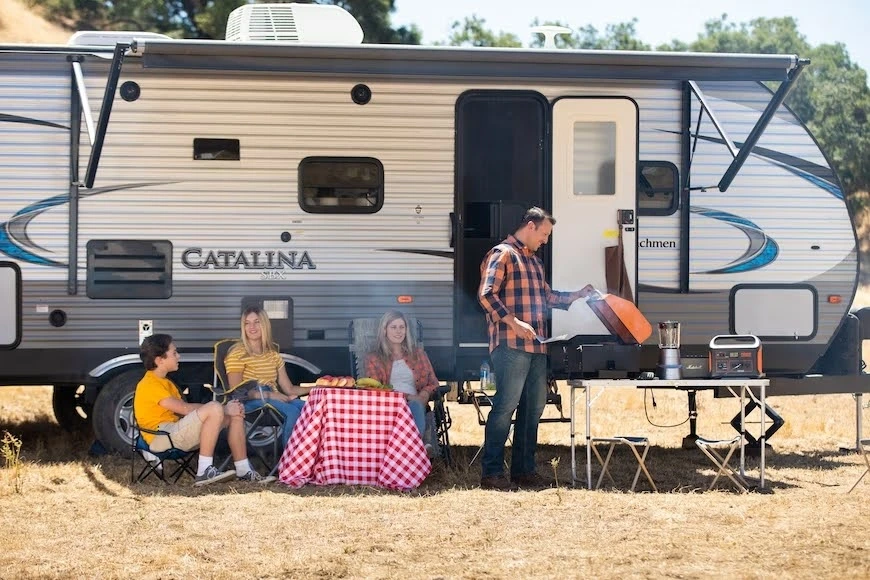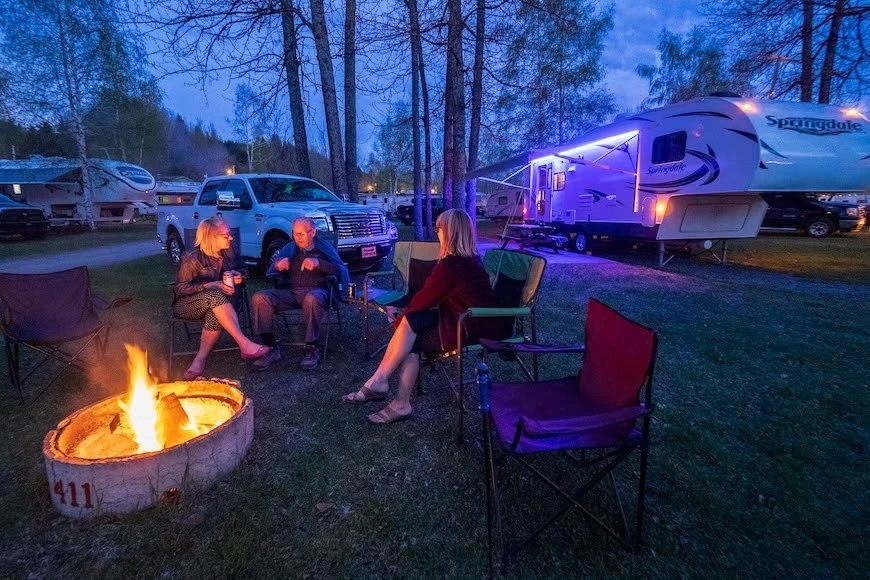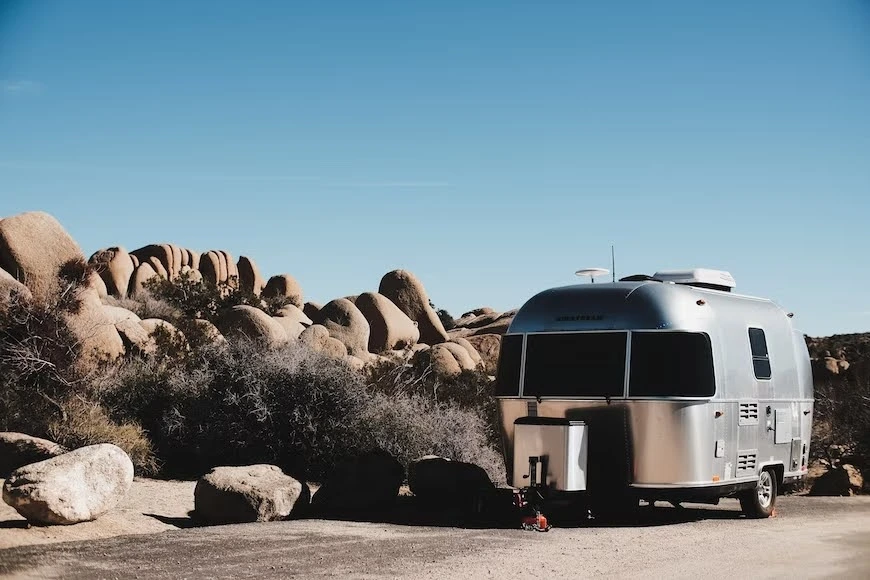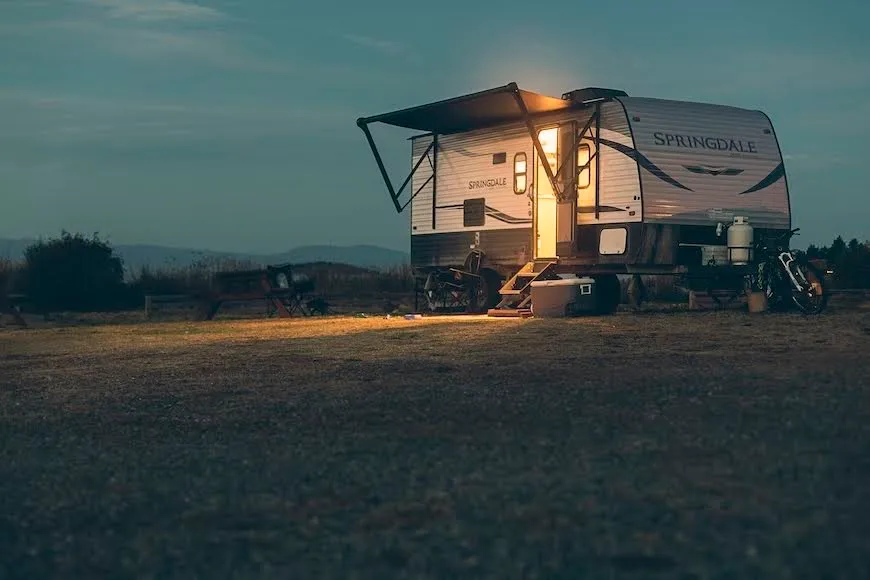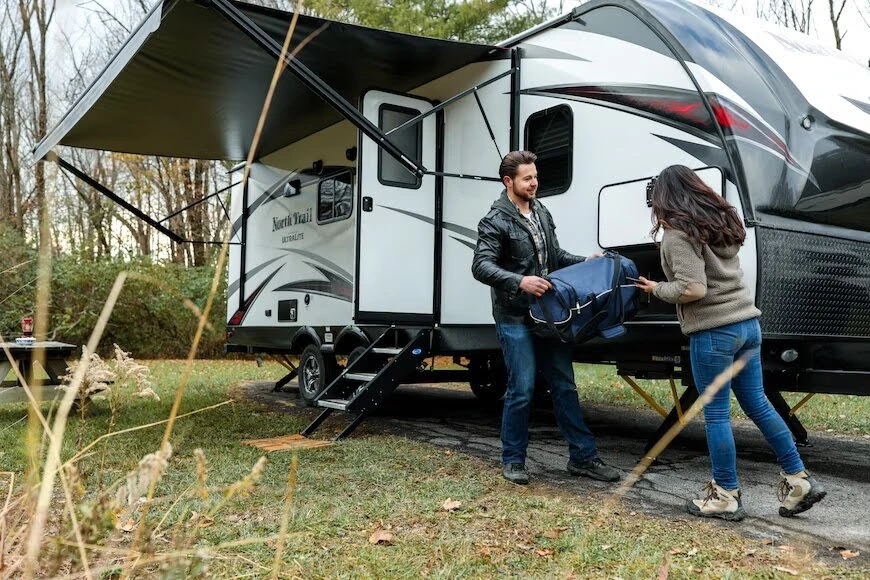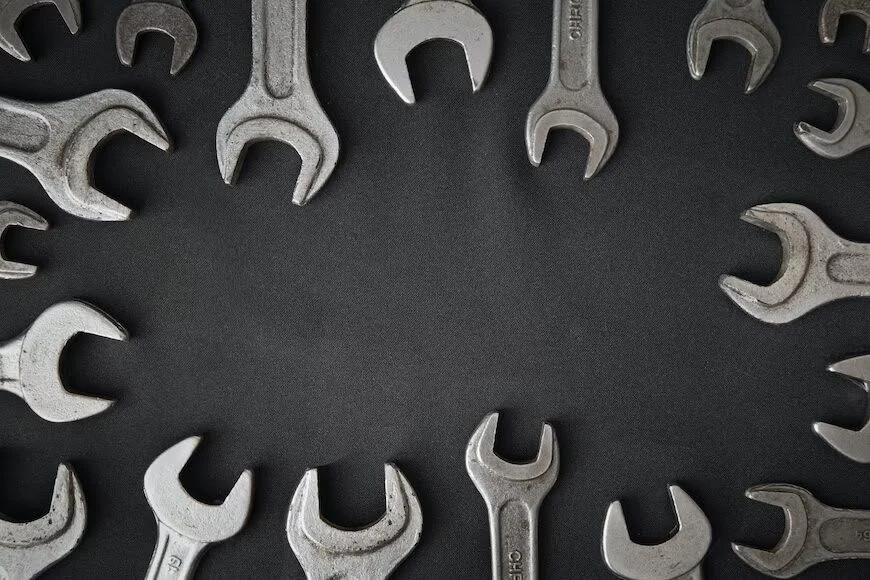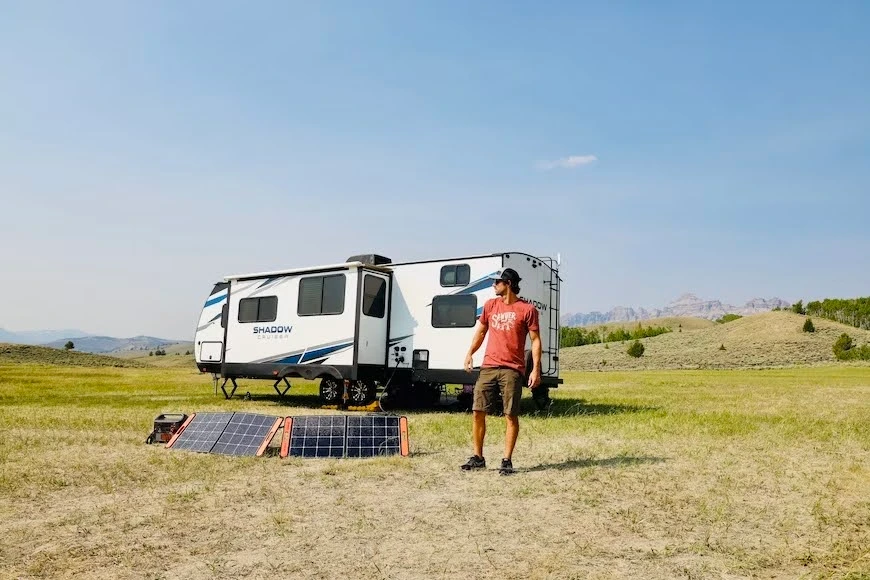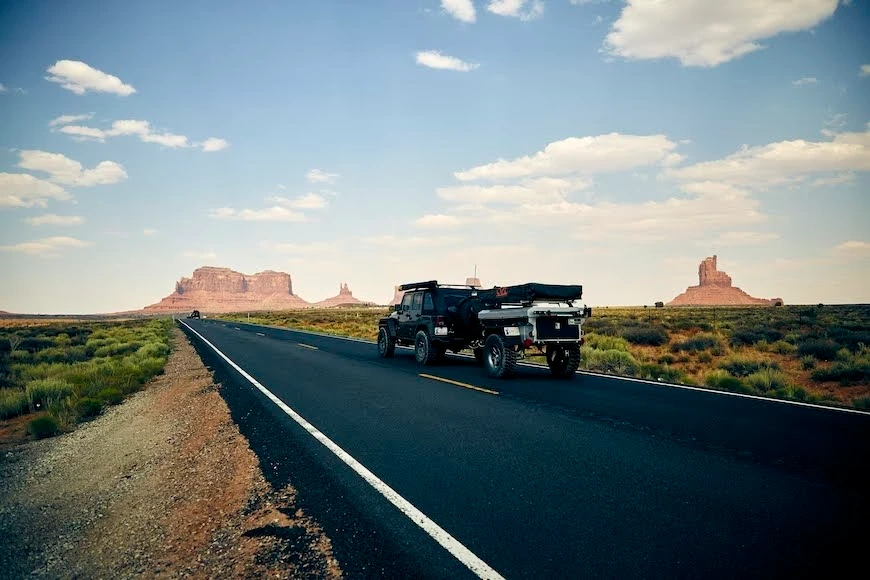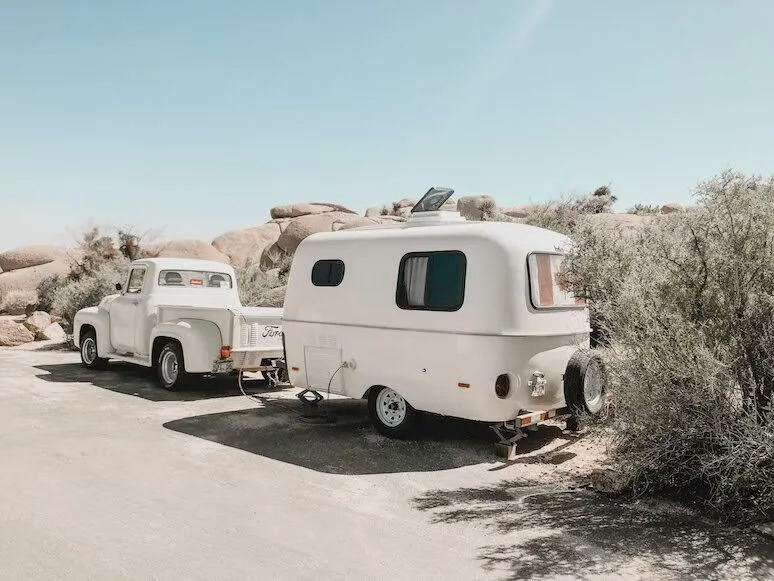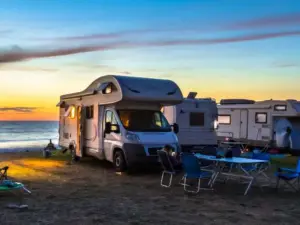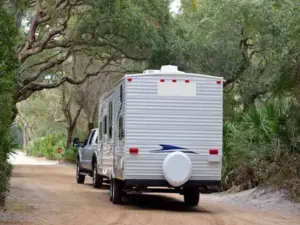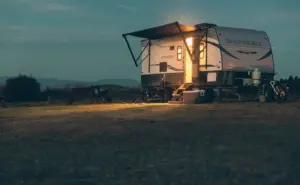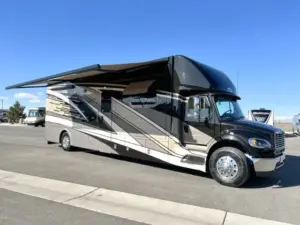Sure, purchasing an RV trailer opens the door to epic adventures and budget travel. But before you head to the dealership, there are plenty of tips for purchasing a travel trailer that you need to learn—like how to determine the right size, what features to prioritize, how to pick a floor plan, and the best platforms to gather reviews.
This post rounds up the best travel trailer buying tips so that you will be more informed and confident when you visit the local dealership.
Read here to learn about travel trailer rental options.
Read here about how to winterize your travel trailer.
How to Handle the Financial Part
What is Your Budget?
Before you start shopping for a travel trailer, ask yourself these questions; How much money are you willing to spend? What monthly payment are you comfortable with? Do you have the finances to upgrade to a powerful tow vehicle?
Budget plays a big role in determining what travel trailer to buy. Here are the average costs of campers and tow trucks.
- Small, Lightweight Trailer – $10k to $20k
- Medium-size Travel Trailer – $20k to $50k
- Larger, Luxurious Travel Trailers – $60k to $80k
- Light-Duty Pickup Trucks – $25k to 40k
- Medium-Duty Pickup Trucks – $30k to 50k
- Heavy-Duty Pickup Trucks – $35k to 60k
Should You Buy a New RV or Secondhand RV?
The perks of a new travel trailer include having the latest features, zero wear and tear, and a full manufacturer warranty. However, new rigs are pretty expensive, and they depreciate fast.
More often than not, you’re better off with a gently used RV trailer. It can be 20% to 40% cheaper, while still having the same features as the latest model. Just make sure you insist upon a professional inspection before buying from a private seller.
Figuring Out Your Travel Needs
Who Will You Go RVing With?
If you want to be a solo traveler, a compact trailer will easily accommodate your needs. But if you’re traveling as a pair or with a family, you’ll need a camper with decent living and storage space. The bigger the crew, the bigger the trailer you’ll need.
Of course, you’ll also want to consider a camper with accessibility features if your loved one has a disability. Pet owners should also scout for a trailer with pet-friendly features.
How is Your Camping Style?
Do you have any RV travel lifestyle in mind? Shop for a rig with off-grid capabilities if you picture yourself boondocking most of the time. Consider luxurious features if you prefer a glamping experience. Look for a spacious camper if you want to RV full time. If you’re an outdoor enthusiast, go for a rugged camper with off-road capabilities plus room for your gear.
Weighing Trailer Types and Features
What Type of RV Suits You?
When tracking down your first RV trailer, you’ll realize there are different types of pull-behinds out there. Here’s a quick breakdown of who each trailer RV type suits the most.
- Teardrop Campers –
Best for solo travelers and couples who want a compact unit that’s easy to tow.
- Pop-up Campers –
Appeal to budget-conscious families looking for a light unit that can be towed by a regular car and still provide large amounts of interior space at the campsite.
- Classic Trailers –
Retro-style campers like Airstreams suit RVers who want luxury and comfort.
- Destination Trailers –
They fit families that want a long-term or full time camping solution because of their tremendous living space and residential-size features.
- Regular Travel Trailers –
They are available in many sizes, shapes, features, and prices, and there’s a model for every type of camper.
- Toy Haulers –
Ideal for campers that want a living area plus a garage space to carry outdoor gear like ATVs, dirt bikes, bicycles, kayaks, and fishing tackle.
- Truck Campers –
Pickup campers are mounted on the bed of a truck and appeal to adventurous souls who want to access anywhere without the hassle of towing a trailer or driving a big motorhome.
- Fifth Wheels –
They suit RVers who have a powerful truck and want lots of room to spread out, plus luxury appointments. Notably, fifth wheels are in a different category of trailers because they require a special hitch installation on the bed of a pickup truck.
Whichever option you go for, research its towing capacity, fuel efficiency, insurance cost, and price in the RV market before approaching local dealers.
Do You Want a Motorhome or Towable?
Of course, you’ll also want to consider whether a motorhome will serve your needs better compared to a travel trailer. Engine-driven RVs are easier to maneuver, safer to drive, and simple to set up once you pull into your site.
The downside is motorhomes are more expensive to buy ($50,000 to $400,000), costly to maintain, and they depreciate faster. On the other hand, travel trailers offer more interior room, better fuel efficiency, excellent boondocking capabilities, and low-maintenance costs.
What Features Are Non-Negotiable?
Think of the main features that matter the most to you before you buy an RV trailer. Ideally, you’ll want enough number of dedicated beds for the crew, a good-size dry or wet bath, and a functional and equipped kitchen.
Further, look for lots of storage areas, ample dining and lounging space, decent-sized holding tanks, and a great manufacturer’s warranty. Nice-to-have features include an air conditioner, hot water heater, power awning, an entertainment system, a solar system, and an arctic package.
What Type of Floor Plan Suits You?
The best way to get a feel of the trailer layout that fits your needs is to visit an RV dealership or RV show. If you have a family, consider a camper with two distinct sleeping areas.
That means looking for a bunkhouse model or multiple-bedroom camper. Couples can go for an open floor plan, while RVers who want to maximize living space can choose an opposing slide-out floor plan.
What RV Size to Look For?
The perfect travel trailer size comes down to how large your crew is and how much weight your vehicle can tow. For small to medium-sized families, a trailer between 20 and 35 feet is a great option.
This size will offer decent interior room, a smooth towing experience, and allow you to easily access most national parks and RV parks. Remember that mammoth trailers can’t use narrow roads or routes with low-clearance bridges.
Other Important Considerations
What to Expect When it Comes to Maintenance?
Generally, the larger and more equipped a travel trailer is, the more parts you need to maintain. But you’re in luck, as a trailer’s maintenance is pretty straightforward compared to a motorized RV. Major maintenance tasks to expect include; inspecting or testing the brakes, tires, and hitching apparatus.
You also need to grease up the suspension wet bolts, lubricate slides, maintain your seams and seals, and check the propane lines for leaks. The owner’s manual will detail the parts and schedule you’ll use to service the trailer. The same applies to your tow vehicle.
How Will You Store Your RV?
Think of how you will store your new RV before making a purchase. Do you have enough room in your garage to park the trailer? If not, you’ll have to build a bigger garage or an RV carport.
That’s if your local ordinance and HOA allow people to park RVs within their property. If parking is banned, or you don’t have the space or finances to build a bigger garage, factor in the cost of parking at a storage facility after every RV trip.
Should You Rent an RV Before Buying?
It’s a brilliant idea to rent a travel trailer before buying one. Book a trailer that has a similar floor plan and features to the one you want. Travel and camp in it for more than a week to get a good feel.
For a more informed choice, rent different trailers so you know what qualities to prioritize, what features you can live without, and what design matches your style of travel.
Where Can You Find Travel Trailer Reviews?
Consult actual RV owners before settling on any travel trailer brand or model. Consumer review data will help you learn about the most common issues affecting a particular brand or model, helping you make an educated purchase.
Start with RV Insider, as it boasts the largest library of firsthand RV reviews. Further, consider purchasing the latest RV Consumer Group Ratings Reports Guides. You can also consult experienced campers on RV life forums like iRV2.com and RV.net.
What’s the Best Place to Buy a Perfect RV Trailer?
The best place to buy a travel trailer depends on whether you want a new or used RV. If you insist on a spanking new rig, visit Camping World, LazyDays RV, or the local RV dealer, or attend RV shows. For the best deal on pre-owned trailers, start with private owners on secure sites like RVT.com, RV Trader, RV Universe, and RVUSA.
Notably, you often get the best deal negotiating directly with a private seller compared to RV dealers or RV manufacturers. So, it’s worth checking out Facebook Marketplace and Craigslist. But be vigilant to avoid scammers.
What’s the Best Time To Buy an RV?
The shopping window you pick affects RV cost significantly. The best time to buy is fall and winter. During these seasons, demand for RVs is low, so dealerships are willing to cut prices in order to move inventory.
Prices are also lower when new RV models hit the showrooms, as most dealers want to sell the old units quickly to create room for the latest rigs. Also, consider entering the RV lifestyle when gas prices rise since many RV owners usually sell due to the rising travel expenses. For cheaper financing options, go shopping when interest rates are low.
Happy Trailer Shopping!
The above tips for purchasing a travel trailer will make your buying process smoother and help you avoid buyer’s remorse. To summarize everything, you’ll want to figure out your needs plus those of your companions, decide your must-have features, compare floor plans at RV dealerships, choose a manageable size, and read reviews.
Read here to find out what special license you need to drive an RV.
Read here to find out about RV dishwashers.

